Faculty Spotlight: Adrian Barbu

Adrian Barbu is a professor in the Department of Statistics, part of the College of Arts and Sciences at Florida State University. Barbu also serves as the graduate student director of the statistics department, and he recently won the FSU Graduate Faculty Mentor award for his dedication to graduate students and commitment to excellence in graduate education. Barbu’s research has been featured in over 50 publications, and he has received more than 20 patents for his work.
Tell us a little about your background and academic credentials.
I was born in Romania. During elementary school, my mom noticed I finished my math homework too quickly, so she asked my teacher to give me extra work. That’s how I discovered my love for math. In high school, I won medals in several prestigious international mathematics competitions.
I earned my bachelor’s degree in mathematics in 1995 from the University of Bucharest – Romania and went to Ohio State University to pursue a doctoral degree in mathematics. Upon earning my first doctoral degree, a professor discovered my aptitudes for computer science and pushed me to pursue another doctoral degree. I completed my second doctoral degree in computer science at the University of California, Los Angeles, in 2005.
Post-graduation, I worked as a research scientist and project manager at Siemens Corporate Research in Princeton, New Jersey. I joined FSU as an assistant professor in 2007 and was promoted to associate professor and professor in 2013 and 2019.
What brought you to Florida State University? Why do you enjoy working at FSU?
When I interviewed at FSU’s Department of Statistics, they offered me an assistant professor position, which I gladly accepted. I enjoy working at FSU because I have the freedom to pursue all my academic research interests, ranging from theoretical problems to applied projects with talented faculty. Moreover, I work on these problems with many graduate students, and seeing them become scientists is an accomplishment alone.
Can you break down your areas of research for us?
My research focuses on computer vision, medical imaging, and machine learning. Machine learning is a branch of artificial intelligence that uses data to train models to make predictions or identify factors that are relevant for scientific outcomes. For example, what factors can predict whether a person will develop diabetes in the next year? Extracting such relevant factors is called “feature selection” within my work.
Computer vision and medical imaging are about interpreting images and extracting information, such as the size of a liver on a medical CT scan. I am interested in building models that can be trained on large datasets with many types of objects. We now have a computer model that can classify over 10,000 different objects into types and functions without retraining the whole model. This is useful in the medical field as scientists and doctors must move quickly to identify and target various parts within the body.
A current project I am leading alongside a graduate student aims to extract nutritional information from websites to build a food search engine. Users could search for specific types of food that satisfy user-defined constraints, such as number of calories, grams of fat and more. This has potential in helping people find foods that are best for them, whether for weight loss, allergies or dietary restrictions.
What inspired you to choose your field of study?
My doctoral degree in computer science focused on computer vision. In the early 2000s, we worked on simple problems and thought this field might be too exotic to be useful for society. Once I joined Siemens Corporate Research team, I learned how to use machine learning techniques for medical imaging and obtained spectacular results. In today’s world, global tech companies use machine learning and computer vision in their products daily, and these fields have exploded with researchers and knowledge.
What do you want the public to know about your research? Why are your topics important?
My food search engine work is important because food has a direct impact on human health and well-being. My large-scale work is important because it allows machines to learn in incremental ways, similar to how humans do it.
What is your favorite part of your job?
My favorite part of this job is my weekly meetings with each of my students, during which I get to see their progress and guide them through their next steps. I try to offer a wide range of support to my students, as some need close guidance and others work more independently.
Who are your role models? Are there certain people who have influenced you most in your life and career?
My doctoral advisor Song Chun Zhu, professor of statistics and computer science at UCLA, and my previous supervisor Dorin Comaniciu, computer scientist and senior vice president of artificial intelligence and digital innovation at Siemens Healthcare, showed me how to combine ambition and experience to build projects that make a difference.
Do you have any exciting upcoming projects or goals you’re working towards?
We are currently developing large-scale models for object detection. For detection, the system needs to answer, “What objects are in the image, and where are they?” It is challenging to design a system that is trained incrementally to answer this question, especially when adding more object types without retraining the whole system.
The food search engine work is the first step towards a larger goal of extracting knowledge about any type of product. While nutrition information has a relatively small degree of variability, the information describing products such as vacuum cleaners or lawnmowers is more free-form, so it is harder to extract the most relevant information. We hope to be able to address this further through our food search engine work.
If your students only learned one thing from you (of course, hopefully they learn much more than that), what would you hope it to be?
Have the courage to work on important problems and believe that you can do it.
